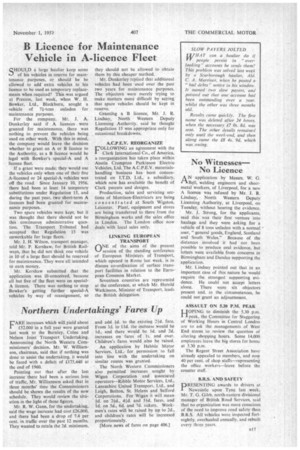B Licence for Maintenance Vehicle in A-licence Fleet
Page 51

If you've noticed an error in this article please click here to report it so we can fix it.
SHOULD a large haulier keep some of his vehicles in reserve for maintenance purposes, or should he be allowed to add extra vehicles to his licence to be used as temporary replacements when required? This was argued at Preston, last week, when W. H. Bowker, Ltd., Blackburn, sought a vehicle of 73-tons unladen for maintenance purposes.
For the company, Mr. J. A. Dunkerley said if A licences were granted for maintenance, there was nothing to prevent the vehicles being used on other work. With this in mind, the company would leave the decision whether to grant an A or B licence to the Authority, as a B licence would be legal with Bowker's special-A and A licence fleet.
If a grant were made, they would use the vehicles only when one of their five A-licensed or 24 special-A vehicles was off the road. Since January 10, 1956, there had been at least 14 temporary substitutions under Regulation 15, and during the past year, two short-term A licences had been granted for maintenance purposes.
Two spare vehicles were kept, but it was thought that there should not be this continuous administrative question. The Transport Tribunal had accepted that Regulation 15 was unworkable for large fleets.
Mr. J. H. Wilson, transport manager, told Mr, P. Kershaw, for British Railways, that he did not think one vehicle in 10 of a large fleet should be reserved for maintenance. They were all intended to earn money.
Mr. Kershaw submitted that the application was ill-conceived, because all but five of the fleet were on specialA licence. There was nothing to stop Bowker's getting further special-A vehicles by •way of reassignment, so they should not be allowed to obtain them by this cheaper method.
Mr. Dunkeriey replied that additional vehicles had been used over the past two years for maintenance purposes. The objectors were merely trying to make matters more difficult by saying that spare vehicles should be kept in reserve.
Granting a B licence, Mr. J. R. Lindsay, North Western Deputy Licensing Authority, said he thought Regulation 15 was appropriate only for occasional breakdowns.
A.C.P.E.Y. REORGANIZE
FOLLOWING an agreement with the Clark International Co., of America, a reorganization has taken place within Austin Crompton Parkinson Electric Vehicles, Ltd. The A.C.P.E.V. materialshandling business has been concentrated on I.T.D. Ltd., a subsidiary, which now has available the benefit of Clark patents and designs.
Production, sales and servicing sections of Morrison-Flectricars are being concentrated at South Wigston. Leicester. Plant, equipment and stores are being transferred to there from the Birmingham works and the sales office in London. The London office now deals with local sales only.
LINKING EUROPEAN TRANSPORT
ONE of the aims of the present session of the standing conference of European Ministers of Transport, which opened in Rome last week. is to discuss co-ordination of surface transport facilities in relation to the European Common Market.
Seventeen countries are represented at the conference, at which Mr. Harold Watkinson, Minister of Transport. leads the British delegation.
























































































































